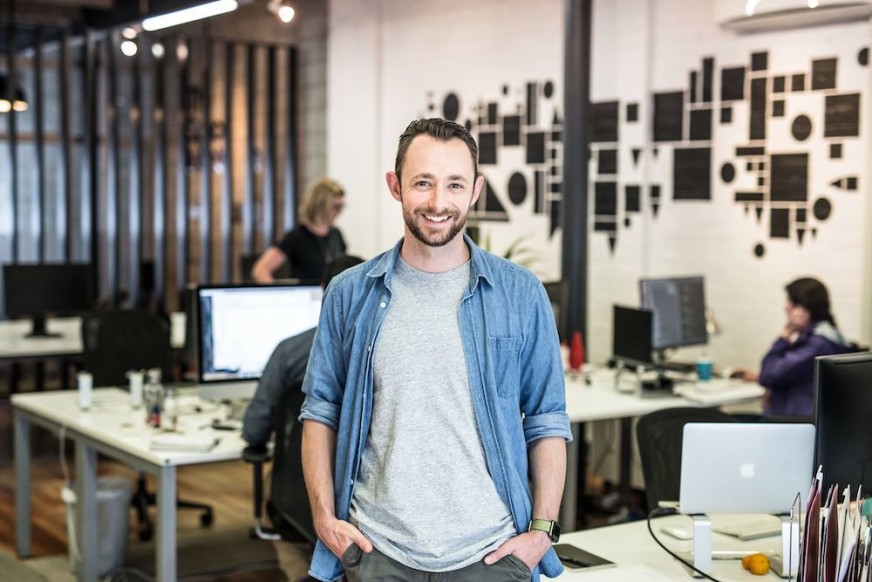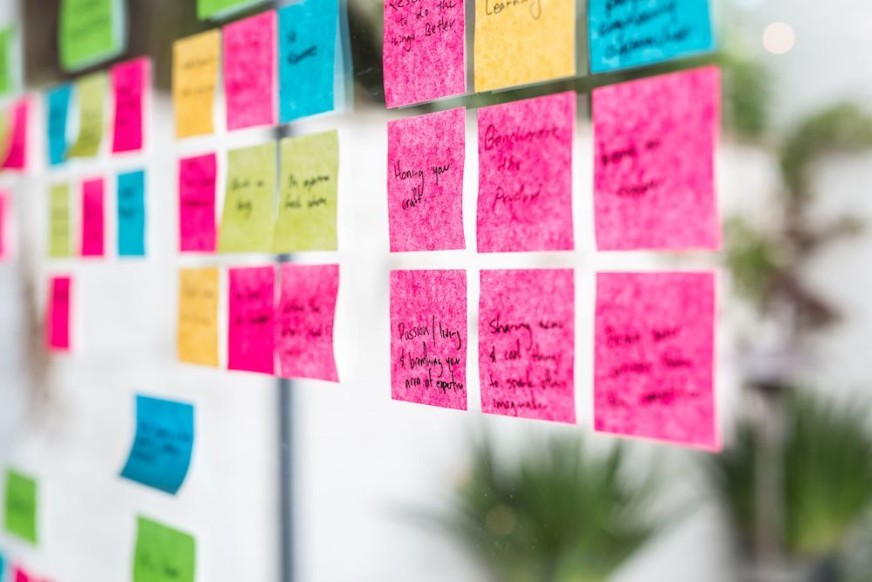Customer Profile: The Space InBetween
Ben spoke with Brendan Jarvis from The Space InBetween - a successful UX Design and Digital Agency in Auckland - about his journey, mentorship, his values and the ‘Why’ behind The Space InBetween.

Hi Brendan, thanks for having us today. Would you perhaps like to start with telling us a little bit about The Space InBetween?
Sure. The Space InBetween started in 2010 and in the beginning we were largely a development company, building websites and apps, but the business has gone through some significant changes over time and has become design-led. We have a strong human centred design approach, including user research and usability testing.
Looking back to 2010, what made you start the Space InBetween?
I’ve always loved computers and technology for the possibilities they enable. I grew up during the dawn of the WWW and the sound of my dial-up modem connecting to the Internet was just something magical - it opened up a whole new world to me.
I started my first ‘digital agency’ in 1995, when I was 10 years old, going through the Yellow Pages and sending companies handwritten faxes on my Grandparents fax machine, letting them know I could make a website for them. I didn’t receive any responses, but my Grandparents did get a large bill... (laughing)
When I was 15, a family friend who ran a pharmacy business gave me my first commercial opportunity - to design, build and market an online store. Which I am still very grateful for by the way, as it kept me from pushing trolleys and taught me a lot along the way. So yes, it was only natural I fell into it as a career.
The business has a unique name, is there any special meaning to it?
It might be a bit of an odd name in a way, but the idea behind it is that there is space between businesses and the people they would like to connect with. It’s our job to help them put things into that space that help them to have better conversations with customers in the marketplace
There is space between businesses and the people they would like to connect with.
That’s really interesting and makes a lot of sense. When you look back is there something you have learned along the way you wish you knew in those early days?
Starting a business is New Zealand is relatively easy and before you know it you are on your way, but the thing I would really like to advise my younger self is to focus on finding the ‘Why’ behind your business. What’s your reason for being? Why are you doing this? Everyone knows what they do, but figuring out why you’re doing it, is much more difficult. I think the ‘Why’ is also much more valuable because if you are clear on that, it can help make other decisions easier.
The other thing I wish I was more aware of, is that once the ‘Why’ is clear, to really think through the model that you use to bring it to life. Not all business models are equal and every business faces challenges, but some models are better than others. So really take the time to test and validate your model. It will make your life in business a lot easier.
Do you think you can learn all that upfront or do you perhaps have to learn the hard way?
That’s a good question. I believe experience is a great teacher and some of those things need to be learned along the way. Having said that, there is a lot of knowledge available on the internet, but also from people who have gone through similar things that you are going through at a certain point in time. And they’re generally willing to help you.
Seek knowledge, read and talk to people because we can learn a lot from other people’s experiences. I’m not saying it will help you to avoid every mistake, but you will definitely be able to at least shortcut some of them.
Do you have specific people you look up to or get mentorship from?
When I was younger I was captivated by captains of industry, like Bill Gates. In terms of mentorship, the family friend I used to work for became a great friend and influence. We still talk to each other regularly.
It’s no secret that life as a business owner can be isolating at times. That’s why I make sure I talk to a select few people regularly, to ensure I don’t take the weight of the world on my shoulders. There aren’t that many things that someone else hasn’t experienced before.
You just mentioned the ‘Why’ and the reasons you do what you do. Could you tell us a bit more about what it is that sets the Space InBetween apart from other agencies?
As designers and technologists, we have to ask ourselves: “What kind of world do we want to create?”
Technology can be a double-edged sword. It’s great in the sense that it lets us do more with less, but sometimes that ends up being doing more with less humanity. We want to address that, to humanise businesses, so that technology is not running the humans, but the humans are running the technology.
We bring people together, designing with our clients and their customers rather than for or to them. This is what sets us apart.
Do you think that mindset is one of the key reasons businesses come to The Space InBetween?
I believe so. Different companies have different levels of maturity when it comes to the way they work and the values they hold. For us it is important to work with people and companies that want to make a meaningful and durable change, who want to make the lives of people better, healthier, more sustainable (even if it’s just in a small way). Those who are willing to build long and lasting relationships.
We need to share those fundamental beliefs, if we’re to be successful and because we have those beliefs, I think it is easier for people to decide whether we are the right fit for them. And if we are not, that’s okay.
Do you also use that mindset in growing your own team?
Absolutely. It’s critical for people to believe in why they come to work and to enjoy it while they’re here.
What changes have you seen in the industry, that people need to keep an eye on or be aware of?
On the demand side, the rise of off-the-shelf solutions like Shopify and Squarespace, has been massive, as it has fundamentally changed people’s expectations. People expect much more for less and they’re able to get it. The problem is that a lot of sites just end up looking the same, they’re just variations on a theme and the companies that buy into that way of doing things just end up looking like commodities.
On the supply side, something that will have big implications for the industry in the near future is AI and automation. I still believe that the architectural and creative decisions will stay with humans, but a good chunk of development will be automated. For some that’s a threat, but I see it as an opportunity for us to use technology as it was designed to be, to free us up to do more creative and meaningful work.
On the other hand what is inspiring you? Any particular projects or a piece of work?
There are heaps of great people doing great work out there, but it’s the overall shift we’re seeing in the way that they’re being delivered - the way that people want to work - that really inspires me. Things that were fringe, like User Experience (UX), Customer Experience (CX) and Human Centred Design, have become mainstream lately, and I’m encouraged by the ways in which they’re being used to move companies to become more human-friendly.
Touching on Customer Experience – could you tell us a bit more about CX and what makes good CX?
CX is how organisations go about building a clear understanding of the people they serve and how they currently serve them, so they can make decisions that will help them to serve them better - better than their competition.
But you can’t create great CX if the company culture is not right. Companies need to realize that building a culture where the customer is at the centre, is not going to happen over night. It requires commitment and it will take time. You have to bring people together for it to happen.
If you want your CX strategy to be successful, you need to break down silos and keep creating experiences that make the customer real for your people. CX is more than metrics and IT. You need to fundamentally change the way the organisation sees itself. It’s about the cultural experience as much as it is about the customer experience.
I know we are jumping around a bit, but we also need to talk a little about SiteHost… So what originally brought The Space InBetween to SiteHost? And why are you still with us today?
When we were considering moving our infrastructure to another partner, we had heard a lot of good things about SiteHost. After meeting Quintin and a few others from the team, it became clear to us just how knowledgeable you guys are. The first time we worked together, you helped us with an unglamourous and challenging migration. The helpful, responsive and caring nature of how you did that was a critical part in our decision to move the rest of our business to SiteHost.
Over the years you have helped us out of a number of tricky situations where our infrastructure knowledge simply wasn’t advanced enough to solve it ourselves. We know we can rely on you and the way you help us has earned you a lot of loyalty.
We speak a similar language in the way we provide services and that alignment is really important for us. We have complete trust in your abilities. When someone from your team says something, we believe it. That trust is critical. All trade is built on trust and you have that.
We really appreciate that and we’ll continue trying to earn that trust. Have you used any other providers in the past and how do we stack up?
Yes, we have used other hosts, some of them local, others overseas, but none of them have come within a mile of you guys. I reckon you are the gold standard. I really mean that. Over the years we’ve probably worked with five different hosting companies, but none of them was an infrastructure partner and that is a fundamental difference.
That’s fantastic! Is there anything else you’d like to say or add?
Yes, there is one thing as a business owner that SiteHost really helps me with. It’s something I probably didn’t realise that I needed at the time we first started working together - or at least I wasn’t able to articulate properly at the time - and that is that you’ve helped me to sleep a lot better at night. I know my client’s infrastructure is in excellent care and I won’t get a flustered phone call in the middle of the night if something goes wrong. There’s always someone there to support the work that we do for our clients and that has been a huge benefit for me as not much is more important than a good night's sleep!


